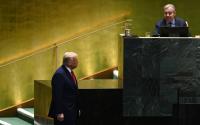20 May 2008Truthdig
What's it got to do with the price of gas? Would some reporter with access to the Republican presidential candidate please ask John McCain why he wants to continue President Bush's Mideast policy when it has proved so ruinous for American taxpayers? Because McCain is determined to ignore our economic meltdown and shift the debate to foreign policy, shouldn't he have to explain why an open-ended military presence in the Mideast will make us economically and militarily more secure when the opposite is clearly the case?
Let's not waste too much time on the military side of the equation. The argument that troops on the ground have made us militarily more secure is absurd on its face. American resources and lives have been squandered in an inane effort that McCain aptly criticized before becoming a presidential candidate. As a Senate watchdog, he distinguished himself by sharply denouncing one defense contractor boondoggle after another in cases involving hundreds of billions for modern weapons that had nothing to do with fighting cave-based terrorists. But as a presidential candidate, McCain now unabashedly apologizes for every twist of the downwind spiral of the Bush administration foreign policy, from wasteful weapons to inhuman torture.
McCain's strategy is clearly that of distracting attention from the calamitous economy by sounding the demagogue's alarm about enemies at the gate. This week, McCain again blasted Democratic presidential candidate Barack Obama on the grounds that he underestimated the threat from Iran while ignoring the vast increase in Iran's power—an increase actually resulting from Bush eliminating Iran's only effective enemy, Saddam Hussein. The other winners in this folly have been the oil kingdoms that Hussein periodically threatened, led by the Saudi royal family. Seizing upon the opportunity presented by the 9/11 attacks, Bush knocked off not the Saudis, who had produced Osama bin Laden and 15 of his hijacker minions, but rather the royal family's sworn enemy in Iraq, who had absolutely nothing do with 9/11.
And how did the Saudis thank us? Just check the price of oil, which has increased more than sixfold since 9/11. On Friday, Bush went to dine at Saudi King Abdullah's bizarrely opulent horse farm and pleaded for an increase in oil production, but to no avail. Bush received the same rebuff in April 2005, when oil was selling for $54 a barrel. On Tuesday, it sold for $129, and the price rise is a good measure of Saudi gratitude for the Bush family's unwavering support over past decades. Saudi Arabia's oil minister, Ali al-Naimi, couldn't have been more condescending when he turned down Bush's request with the observation that "presidents and kings have every right, every privilege, to comment or ask or say whatever they want." He added at a press conference, "How much does Saudi Arabia need to do to satisfy people who are questioning our oil practices and policies?"
Enough to get the price back down to where it was when we saved your sorry oil-well excuse for a country, you ingrate, Bush might have retorted. But our bold leader was too polite for anything like that. "He didn't punch any tables or shout at anybody," said Saudi Foreign Minister Saud al-Faisal. "I think he was satisfied." Why? Instead of pointing out that the Saudis could easily open their spigots in gratitude for our keeping them in power, the president threatened the Saudi king not with an invasion but with a U.S. recession. "My point to His Majesty," Bush warned in an interview with The New York Times before encountering the great man himself, "is going to be, when consumers have less purchasing power because of high prices of gasoline—in other words, when it affects their families, it could cause this economy to slow down. If the economy slows down, there will be less barrels of oil purchased."
He'll show them—we'll have a recession, our families will suffer and, boy, will the Saudis be sorry. A regular Teddy Roosevelt. There is no better measure of the failure of Bush's foreign policy than that, five years after we conquered the second-most important pool of oil in the world, the American taxpayers who paid for this grand imperial adventure are rewarded with skyrocketing prices at the pump.
At least when Bush first hyped his Iraq invasion plan, he had Paul Wolfowitz telling Congress that Iraqi oil would more than pay for it all. Not so McCain, who is so charged with imperial hubris that he is willing to commit to a 100-year lease on Iraq without expecting a penny in oil revenue in return.






